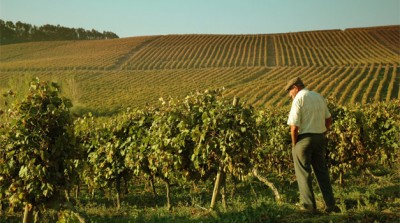| Reviews & Columns |
|
Reviews DVD TV on DVD Blu-ray 4K UHD International DVDs In Theaters Reviews by Studio Video Games Features Collector Series DVDs Easter Egg Database Interviews DVD Talk Radio Feature Articles Columns Anime Talk DVD Savant Horror DVDs The M.O.D. Squad Art House HD Talk Silent DVD
|
DVD Talk Forum |
|
|
| Resources |
|
DVD Price Search Customer Service #'s RCE Info Links |
|
Columns
|
|
|
Mondovino: The Complete Series

Mondovino: The Series is a ten-part expansion of the 2004 feature by Jonathan Nossiter. This documentary on globalization in the wine business and its effect on viticulture won multiple prizes and was one of only four documentaries to have ever been nominated for the Palme d'Or at the Cannes Film Festival. This four-disc set comprises a massively-detailed broadening of the feature that provides a more inclusive, richly-illustrated status report on the global wine trade.
Across ten hour-long episodes that utilize a free-flowing thematically-oriented editorial style jumping from the Napa Valley to Bordeaux to Paris to New York City, Mondovino looks at wine from several angles. We see winemakers big and small from the United States, France, and Italy. We meet wine merchants and wine critics. We learn about how wine is made and how it is sold. Whereas the feature version of Mondovino focuses on the rivalry between the United States and France (not necessarily in terms of the wines themselves, but in terms of the way business is conducted), the series opens up and really takes a "Europe versus United States" view, while maintaining an investigative eye on the influence of big "corporate" wineries on smaller family-owned operations.
Nossiter is biased, first of all. As an artist himself, he obviously values winemaking in its purest form - starting with the attention to grapes and soil, the core ingredients of good wine. The series' point of view emphasizes the finer points of these two elements, while cultivating an appreciation for the sensitivity to small changes in weather, environment, and grape-handling that can affect what ends up in the bottle. What Nossiter decries is the commoditization of wine beyond all reason - the ruthless attitude toward grape and soil that characterizes the larger wine trade, made up of multinational winemaking corporations, import/export merchants, and certain all-powerful critics (particularly Robert Parker). Much like the art world of the early 20th century, the contemporary wine trade has taken a business that has historically relied on finely-honed talent and compressed it to a point where only occasional narrow beams of light escape from a black hole of commercial expedience.
Mondovino has been praised and condemned with almost equal enthusiasm. Much of the criticism has taken an anti-American angle. Mondovino takes on one of the biggest forces in the wine world: the Mondavi family of California. While its incontestable that Robert Mondavi is one of the primary reasons that California has become a major wine-producing region, his company's very American free-market corporate approach is anathema to centuries of craftsman-like winemaking. Mondavi's market ambitions parallel Starbucks and Microsoft in his quest for hegemony, and it's this attitude that Nossiter and many of his subjects take issue with. In the series, the Mondavis come off more sympathetically than in the feature. Certainly these are not evil people - they are, however, Americans doing business in an American fashion. This, paired with the fact that their product is historically European, is the crux of much of the tension between the Mondavis and the French. The blinkered single-mindedness that makes a good capitalist may not be in the best interests of a product that requires patience, parental coddling, and occasional failure.
The depersonalization of wine and its homogenization by corporate strategy threatens vintners everywhere. Although those threatened by Mondavi mostly take the person of small family-owned French wineries in the series, Nossiter is not posing a strictly French versus American battle. It is, again, a matter of attitude that is at issue here - a quasi-private family tradition versus the predictable sameness of the multi-national behemoths. It's wine as a hand-crafted mosaic of ingredients versus wine as a consumable to be produced as cheaply as possible. There is snobbery in the attitude of the small French winemakers interviewed by Nossiter, yet it's a snobbery born not of superiority, but of the intimate multi-generational knowledge of how to use refined methods to cultivate and reward refined tastes. This knowledge is taken for granted by those such as Mondavi, whose methods and "secrets" were codified long ago - normalized to maintain rising profits that depended upon a branded predictability.
Nossiter's bias, clear as it is, does not hinder the film nor does it bother or distract me. Not because I necessarily sympathize with it, but because it's transparent. There is no hidden agenda here, but rather the honest and curious investigation by an intrepid filmmaker who has spent an enormous amount of time (four years) sifting through information, experiencing the wine business first hand, and has come to some sound, informed conclusions. Nossiter's thoroughness is even more evident in the series than it was in the feature, and multiple points of view are well-documented. The Mondavis have more screen time here, as does the self-anointed dean of wine critics, Robert Parker.
Ultimately, Nossiter's enquiry results in an obvious conclusion - one that is implied throughout the film. If you wish to find the varied experiences that wine has to offer, you must be inquisitive and adventurous. Choose your own wines, rather than just relying on readily-available standbys. Seek out the right wine shop; try out regional varietals that are new to you. Dive in; your purchases make a difference in the increasingly corporate wine marketplace. If the Mondavis and their like-minded competitors have their way, our choices will become increasingly limited and traditional winemaking will evaporate faster than you can say "micro-oxygenation."
The DVD
The Package
The four discs are housed economically within a well-designed single-width keepcase. A card slipcase covers that. The cover art and menu design is nicely executed.
The Video and Audio
The technical quality leaves something to be desired, although this is a function of the way in which the film was planned and shot. The enhanced 1.78:1 image is jam-packed with video noise and artifacts. The film was shot on video, but it was only made a few years ago, so I'm not clear about why the image looks so slushy. It's worth noting that the feature didn't look great, either, so I'm assuming the problem lay at the source and not in the mastering. The stereo soundtrack is good, although it's got some hiccups in it due to the fact that this is live sound, recorded in the field under circumstances that were less than ideal.
The Extras
None. This is a disappointment; commentary tracks on at least a few episodes would have been nice. Due to the documentary's thoroughness, I doubt if any behind-the-scenes footage would have been terribly illuminating. But maybe some featurettes on different methods of winemaking, or something like that?
Final Thoughts
Jonathan Nossiter's Mondovino: The Series is an incredibly detailed, probing look at the current state of the international wine trade. Although it's going to rub some the wrong way, this is a diligently-crafted series that will delight even the most casual oenophile. It's fascinating work, and despite the lackluster technical presentation and dearth of bonus content, this is highly recommended.
|
| Popular Reviews |
| Sponsored Links |
|
|
| Sponsored Links |
|
|
| Release List | Reviews | Shop | Newsletter | Forum | DVD Giveaways | Blu-Ray | Advertise |
|
Copyright 2024 DVDTalk.com All Rights Reserved. Legal Info, Privacy Policy, Terms of Use,
Manage Preferences,
Your Privacy Choices | |||||||














